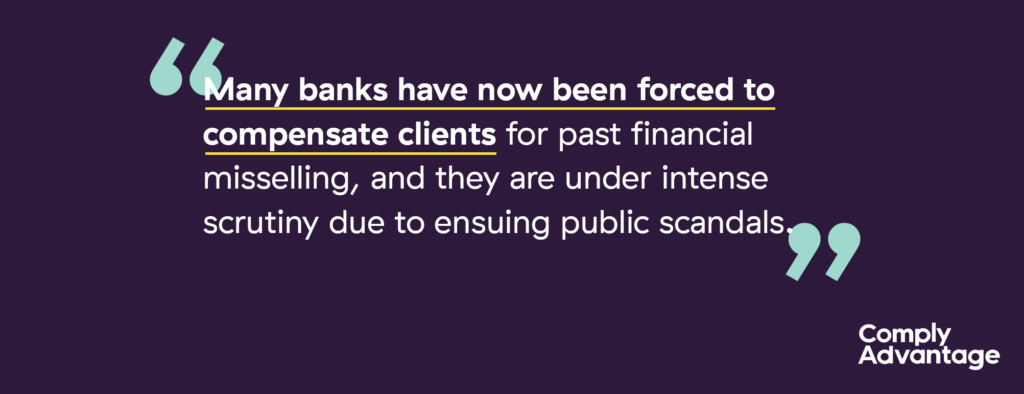Learn more about AML Solutions
Our AML solutions will help you prevent financial crime and stay compliant with the most up-to-date regulations.
Request a DemoIn its most simple form, financial misselling means recklessly misrepresenting a product or service in order to successfully complete a sale. Financial products are usually “missold” in order to make an individual or company complete a purchase that does not properly suit their needs.
Financial misselling is illegal in most countries.
A basic example of misselling would be a person with no dependents being manipulated into buying life insurance. Of course, as this person has no financial dependents, the insurance serves no purpose other than to add to the insurer’s profits.
When looking at financial misselling, it is important to distinguish between the two types that occur most frequently: material misrepresentation and suitability.
Material misrepresentation means making a product or service appear to be something that it is not. In other words, the salesperson intentionally misleads the customer, either by giving incomplete details regarding a sale or by providing the customer with entirely false information.
Suitability misselling, on the other hand, entails selling an unsuitable product or service to a customer. Invalid insurance, as above, is a prime example of this. When a company is caught practising either type of financial misselling, it is usually required to compensate its customers for the money they lost.
There are many different perpetrators of financial misselling across the financial sector.
When you hear financial misselling referenced in the media, though, it is likely related to banks.

Over the past few years, banks have been found misselling several products to clients, including investments and ISAs. Lloyd’s Banking Group is one of the banks that has been most heavily criticised for misselling to its clients, and is now facing severe repercussions.
Many banks have now been forced to compensate clients for past financial misselling, and they are under intense scrutiny due to ensuing public scandals.
Perhaps the largest of these scandals, and one in which Britain’s four largest banks (and several others) were complicit, was the misselling of payment protection insurance, otherwise known as PPI.
The PPI scandal has been one of the largest to rock the British financial sector in years, and the FCA is frantically trying to set matters right. Over 400,000 cases are still unresolved, and some banks continue to deny the severity of the scandal.
Nevertheless, as of March 2016, the banks had given out more than £23.8 billion in PPI-related compensation.
Our AML solutions will help you prevent financial crime and stay compliant with the most up-to-date regulations.
Request a DemoOriginally published 02 July 2014, updated 26 March 2024
Disclaimer: This is for general information only. The information presented does not constitute legal advice. ComplyAdvantage accepts no responsibility for any information contained herein and disclaims and excludes any liability in respect of the contents or for action taken based on this information.
Copyright © 2025 IVXS UK Limited (trading as ComplyAdvantage).